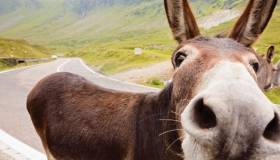
November 6, 2019 – If you were to ask a horse owner or veterinarian their greatest equine health concern, the answer might surprise you. Foot and leg injuries are devastating in horses, and often highlighted in popular press. But a recent survey from the American Association of Equine Practitioners shows colic (abdominal pain due to any cause) ranks first in health worries from those who know horses best.
Colic is common in horses because of their specialized digestive tract which differs from other grazing animals. It doesn’t take much to throw their digestive tract off balance. Most colic cases can be resolved on the farm with medical treatment, but approximately 10% to 15% of colic cases need advanced care. This may include more intensive medical therapy or even surgery. Severe cases can lead to difficult decisions about euthanasia.
Morris Animal Foundation-funded researcher Dr. Megan Burke, at North Carolina State University, knows firsthand the financial burden horse owners face when they come to the clinic. Although post-surgery survival rates are good, the expense of surgery is discouraging for many owners.
“What motivates me and my research is how can we make not only the odds of survival better, but keep costs down,” said Dr. Burke. “The truth of the matter is that surgery and postoperative care are expensive. It doesn’t matter if your horse has a fixable problem. If an owner can’t afford surgery, you have no other options.
Dr. Burke is looking at the way antibiotics are administered in post-surgical patients. Horses usually receive antibiotics for several days after surgery and this therapy alone can account for up to 10% of costs. Dr. Burke is studying whether cutting antibiotic use from several days down to just 24 hours after surgery has any effect on complication rates and long-term survival.
“If we can discover ways we can have just as good an outcome and cut costs,” said Dr. Burke, “that’s money we can save and get more horses to surgery.”
For Dr. Burke and her team, this means saving more lives as well as using antibiotics in a more responsible way. We want to help horses live longer, healthier lives after colic surgery. This study could move us closer to achieving this goal!




